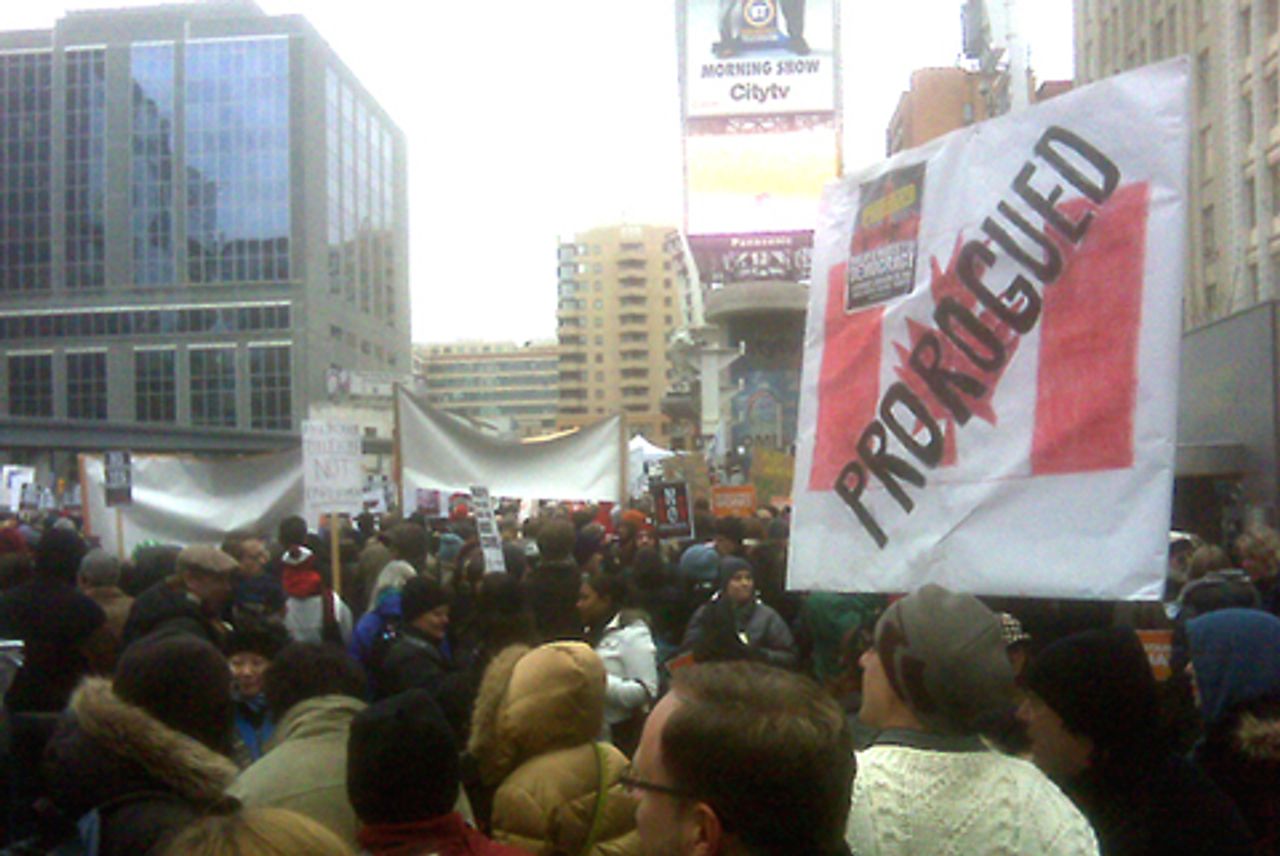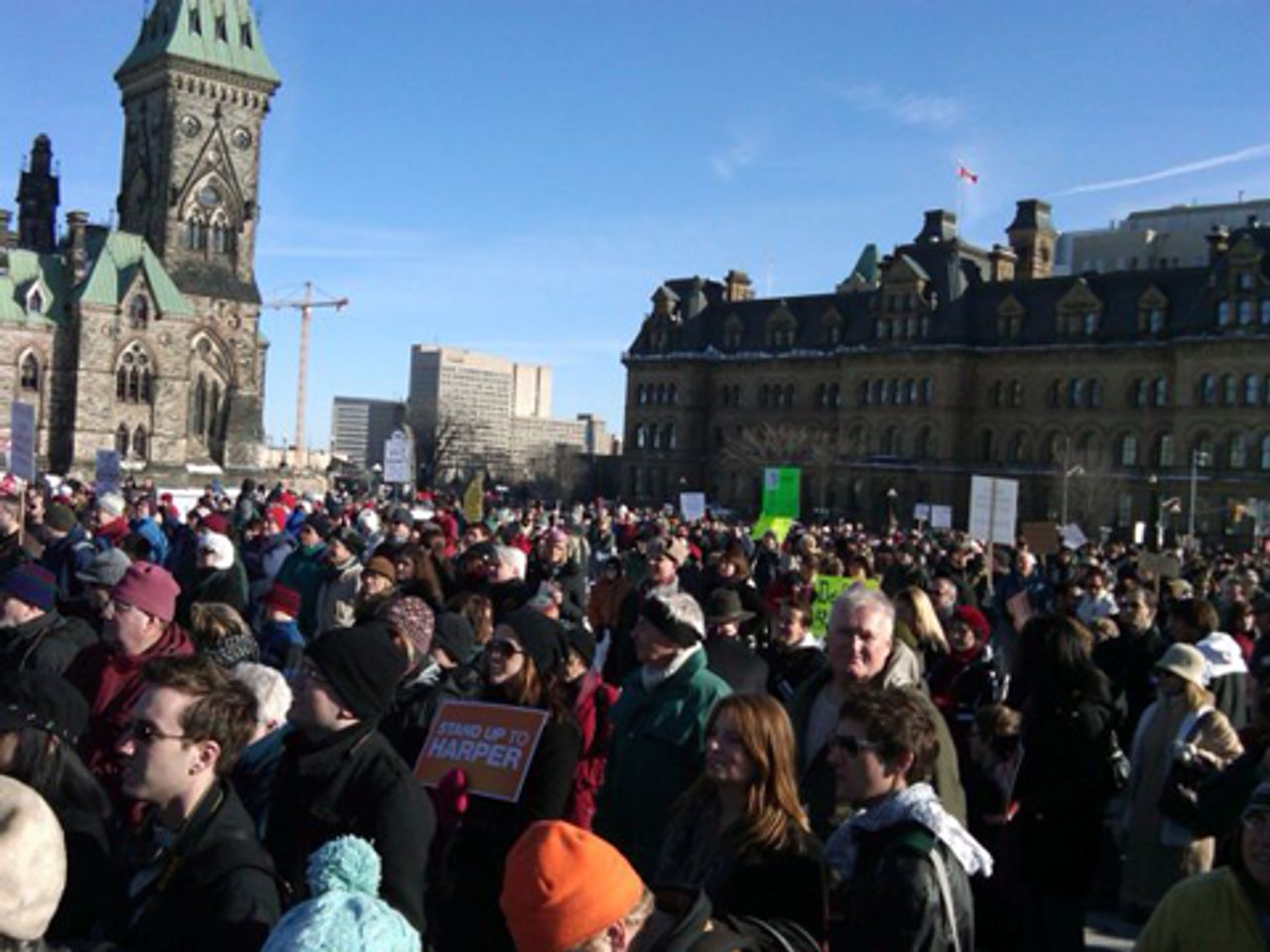Demonstrations and rallies were held in some 60 cities and towns across Canada last Saturday to oppose the minority Conservative government’s shutting down of parliament for two months.
 A section of the anti-prorogation demonstration in Toronto
A section of the anti-prorogation demonstration in TorontoFurtively, on the second to last day of 2009, Prime Minister Stephen Harper had parliament prorogued—temporarily shut down—as part of his government’s long-running campaign to prevent any exposure of its and the Canadian Armed Forces’ complicity in the torture of Afghan detainees.
This was the second time in a year that the Conservatives used prorogation to extricate themselves from political difficulties.
In a far more egregious violation of democratic norms, the Conservatives, with the overwhelming support of big business, prevailed on the unelected and unaccountable governor-general to shut down parliament for six weeks in early December 2008 so as to prevent the opposition parties from voting no-confidence in the government.
Saturday’s protests were very much establishment affairs, with sections of the corporate media promoting participation in, and lavishing attention on, the demonstrations. The Globe and Mail, the traditional voice of Canada’s Bay Street financial elite, devoted its entire editorial section on Saturday to a piece titled “Time to Stand Up for Parliament.”
While the demonstrations were not insignificant—3,000 attended in Toronto, 3,500 or more in Ottawa and perhaps 30,000 in Canada’s fifteen largest cities—the numbers pale in comparison with the hundreds of thousands who took to the streets in February-March 2003 to oppose the impending US invasion of Iraq.
The protests were socially and politically very heterogeneous, including Liberals, supporters of the social-democratic New Democratic Party (NDP), professionals, trade unionists and young people.
Much has been made of the fact that the protests arose from a Facebook campaign that developed outside the major political parties, trade unions, or indeed any pre-exiting organization.
The Liberals and NDP initially made only pro forma statements opposing prorogation, signaling their intention to meekly submit to Harper’s latest diktat, just as they had bowed before his December 2008 constitutional coup.
The opposition parties only plucked up their courage after Harper’s arbitrary action had sparked a popular outcry and much of the corporate media had criticized the latest prorogation. The latter have done so because they believe Harper is needlessly discrediting the traditional institutions of the elite and under conditions where there is already mass popular disaffection with electoral politics. “The Prime Minister,” complained Saturday’s Globe editorial, “is misusing the power to shut down Parliament, and in the process destabilizing Canada’s democracy.”
Whilst the anti-prorogation movement started outside the traditional establishment, the Liberals, NDP, the trade unions and the protest organizations and lobby groups that orbit around them have very quickly moved to politically appropriate it. The more they go on about “grassroots” mobilization, the more they seek to tie the opposition to Harper’s anti-democratic actions to the establishment.
The Ottawa rally, which was held on Parliament Hill, was addressed by Liberal leader Michael Ignatieff and NDP leader Jack Layton.
Ignatieff is notorious for his use of his credentials as a liberal intellectual to support the Iraq War and torture. But he took advantage of the platform that had been given him Saturday to cast himself as a champion of democracy. Said Ignatieff, “This is a demonstration that shows that Canadians understand their democracy, care for their democracy and if necessary, will fight for their democracy.”
NDP leader Jack Layton denounced Harper for shutting down “the people’s house,” then appealed to Harper, “it’s not too late to recall Parliament. It’s prorogued, but you can call us back to work simply by picking up the phone and calling the governor-general.”
The NDP, which helped the Harper government survive a non-confidence vote last fall, has repeatedly offered to collaborate with the Conservatives if they immediately recall parliament. This has included pledging to help the Conservatives secure speedy passage of a raft of reactionary law-and-order and national security bills that died with the proroguing of parliament.
Rabble.ca, an ostensibly left-activist web site that is financially supported by the trade union bureaucracy, has been shameless in promoting the anti-prorogation campaign as a multi-class movement for democracy through which it hopes to revive the abortive Liberal-NDP coalition government of December 2008—a “progressive” alternative government that was pledged to implementing the Tories’ $50 billion-plus tax cut and waging war in Afghanistan.
Gushing with enthusiasm, Judy Rebick, one of the founders of rabble.ca, told Saturday’s rally in Toronto, “I have been an activist for more then 40 years and never, never in all that time have I seen a spontaneous protest that built like this and became so strong in so short a time. … Let me tell the cynics, there never was a protest like this in the 1960s.”
Rebick went on to exult that “the political parties are following us and well they should. In two weeks you have brought Mr. Harper’s numbers down from almost a majority to losing the next election.”
In a comment published Monday, Rebick’s fellow Rabble blogger and Energy and Chemical Workers Union official Fred Wilson hailed Saturday’s “non-partisan outpouring,” saying it raised “the question once again of what kind of minority government may replace the present one.”
The Socialist Equality Party intervened in Saturday’s demonstrations, distributing a statement that explained the necessity of basing the struggle to defend democratic rights on the independent political mobilization of the working class.
The statement read in part: “The Socialist Equality Party insists that the turn of the Harper Conservative government and Canada’s ruling elite as whole toward more authoritarian forms of rule cannot be defeated by appealing to establishment parties to defend and reform bourgeois parliamentary institutions that are crumbling under the impact of the capitalist crisis
“What is required is the independent political intervention of the working class on the basis of its own program—a program that fuses the defence of democratic rights with the struggle to defend jobs and public services and against imperialist war. …
“The Conservatives’ use of prorogation to undemocratically cling to power and cover up their commission of war crimes was the culmination of a decade of mounting attacks on democratic rights—attacks often spearheaded by the Liberals. …
“This process is paralleled by developments in all the other advanced capitalist countries. In the US, the Republicans sought to use a sex scandal to unseat Bill Clinton, then, with the sanction of the US Supreme Court, stole the 2000 election. The September 11, 2001 terrorist attacks and trumped-up claims of weapons of mass destruction were used to stampede the US into illegal wars of aggression in Afghanistan and Iraq and to vastly expand the powers of the state and the national security apparatus, effectively laying the groundwork for a police state. …
“Behind this universal assault on democratic rights lies deepening and explosive class cleavages. The past quarter century has seen a vast growth in social inequality and economic insecurity, as the various rival national bourgeoisies, locked in a ferocious struggle for markets and profits, seek to expand their wealth and geo-political power. Governments, whether nominally of the left or right, have pursued social reaction at home—the dismantling of the welfare state, privatization and deregulation, and tax cuts designed to enrich the most privileged layers—while pursuing imperialist war abroad.”
(For the full statement, see “Protests against shutdown of Canadian parliament:
A socialist policy to defend democratic rights”)
* * *
A WSWS supporter submitted the following report on the Ottawa demonstration:
 Saturday’s rally outside Canada's parliament buildings in Ottawa
Saturday’s rally outside Canada's parliament buildings in OttawaI attended the anti-prorogation rally on Ottawa’s Parliament Hill on Saturday. Upwards of 4,000 protesters braved freezing cold to protest their opposition to Steven Harper’s unilateral decision to prorogue Parliament.
Many protest groups and unions had representatives speak, including Maude Barlow of the nationalist Council of Canadians. Few in any way connected the prorogation crisis to the crisis of democratic governance internationally, except in relation to Canada’s role in the occupation of Afghanistan. The speaker from the NGO group Peace Now went the farthest, in urging participants to “connect the dots” of what this prorogation is—just the most recent example in the assault on democratic governance throughout the world.
Representatives of environmental groups expressed exasperation at the Canadian government’s intransigence at the Copenhagen Climate Change talks.
Native groups also spoke of how the expansion of their property rights under the colonial-era Indian Act is being delayed by prorogation. They also spoke of how many of their communities are having their health adversely affected by petro-chemical extraction in Alberta’s northern tar-sands.
The leaders of Canada’s parliamentary opposition also spoke. The leader of Canada’s main social democratic party, the NDP, spoke first, proposing legislation to limit the PM’s power to prorogue without Parliament’s consent.
Liberal leader Michael Ignatieff seemed barely able to contain his sense of disbelief at the entire event. He stated his “admiration and pride”, while displaying his paternalistic contempt for Canadians, stating that he was “proud” of them, that they “understand what prorogation means.”
Ignatieff made no mention of Layton’s proposal to limit the PM’s prorogation powers. It has been widely reported in the press that he has no intention to do so because he is counting on using the exact same anti-democratic measure should he get elected to lead a minority government.
The protest often descended into mindless slogan-chanting. “Get back to work” was the most common, mimicking the rhetoric of the bourgeois anti-tax movement. The rally was decidedly nationalistic in tone, but one speaker did speak to her sense of irony that “Canada would ever need a pro-democracy movement”.
The cobbled-together grouping of green-activists, liberal and social-democratic politicians was unable or unwilling to present any meaningful challenge to the bankrupt capitalist system or how this crisis is linked to a crisis of democracy on a global scale.
